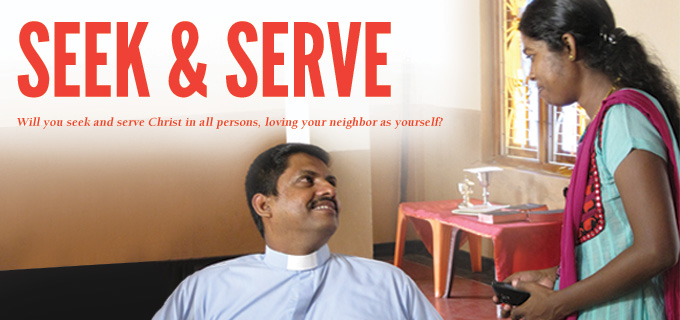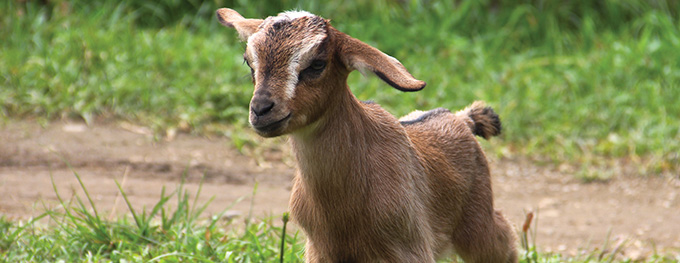|
|

|
|
|
|
Letter From The President
|
|
|

|
|
|
One of the great pleasures of my work is collaborating across the Anglican Communion to address some of the most difficult problems facing communities in the developing world.
An important way that Episcopal Relief & Development and other Anglican agencies collaborate is through the
Anglican Alliance for Relief, Development and Advocacy. The Alliance grew out of the Lambeth Conference of 2008 and an urgent call by the bishops from around the Communion to coordinate and improve efforts in the three key areas of relief, development, and advocacy.
Episcopal Relief & Development is proud to have been one of the founding agencies of the Alliance, and I am
honored to serve on its Board as we work to improve cooperation and strengthen capacity to meet the needs of some of the world's most vulnerable populations.
One of the innovative ways that Episcopal Relief & Development and its partners are doing the work of
"healing a hurting world" at the community level is through our savings with education program. I have
recently had the opportunity to visit these programs in Zambia, Sri Lanka, Ghana, and Colombia to see
firsthand the impact they're having.
Our savings with education program has the same essential elements in each country, with slight variations based on the local culture and aspiration. We target those with the greatest need, who are often unable to access conventional micro-finance opportunities, and we bring them together to form savings circles. These groups make their own rules, including how much money members will contribute each week — in some cases it can be as little as a few cents. Over time, as the assets of the savings groups grow, the members make applications to borrow funds out of the pooled savings to invest in small enterprises, buy supplies, or pay school fees. The groups approve loans and then agree to the interest rate and fixed term of the loan (usually 12 or 18 months).
At the end of the cycle, the group divides up the collected assets of the savings circle, much as one would in a cooperative bank. It's amazing how quickly the assets build — in Angola, the savings groups have generated over $200,000 in resources for their members. Financial education and training are also included, bolstering a sense of energy and new opportunity among the group members, and helping to ensure they will be successful.
In addition to being highly effective, the programs are inexpensive. The real work lies in setting them up, doing the training, and conducting the follow-up monitoring and evaluation, but the community itself provides the actual capital for the loans. These savings with education programs are truly an example of multiplying loaves and fishes and unlocking abundance where one would least expect to find it.
It is in this spirit that we do all of our work, and experience the joy of acting in Jesus' name.
|
|
|

|
|
Yours faithfully,
|

|
Robert W. Radtke
President
Episcopal Relief & Development
|
|
|
|
|
|
|
|
|
|
COUNTRY FOCUS: SRI LANKA: Both Hands Clapping
|
|
In recent decades, the country of Sri Lanka has experienced both man-made and natural disasters. A 25-year civil war brought decades of violence, and in its aftermath hundreds of thousands have been displaced. The devastating tsunami of 2004 battered the country, killing tens of thousands of Sri Lankans and leaving more than a million homeless. And in 2010, major monsoons led to widespread flooding.
In response to these hardships, Episcopal Relief & Development has been partnering with the Diocese of Colombo to focus on long-term recovery and rebuilding, including the implementation of risk-reduction strategies outlined in the "Pastors and Disasters Toolkit." This toolkit was developed by Episcopal Relief & Development partners to help local faith leaders and their communities prepare for, mitigate, and respond to disasters efficiently and effectively.
Father Manoruban of St. Paul's Church in Morakotanchenai is engaging his community to build resilience. He has assembled the youth of the parish into teams for disaster preparedness and response, to ready the region for the flooding that is increasingly an inevitable part of life. "We know how and in which way the water will enter the village," Father Manoruban says. "We can plan for disaster and take people to a safer place."
We also formed a partnership with the Geneva-based Ecumenical Church Loan Fund (ECLOF) to support income-generating activities in regions affected by the tsunami and other marginalized areas. By offering microfinance services that center on savings and education rather than taking on debt, this program enables people to build their personal savings, invest in small business endeavors, and earn income to support their families and rebuild their lives. More than 95 percent of the participants are women, and participation in the program allows them to gain social standing and a voice in decision-making as they contribute to their household income.
Mrs. Amalathas Sacikala, a resident of the town of Mannar, has taken out and repaid two loans so far, enabling her to invest in her husband's small rice mill. With the upgrades to the mill, she and her husband have increased their income, and she has been able to open a bank account for their child. She hopes to take out a third loan to expand the mill further, by adding plates to grind spices and grains.
We met another thriving program participant on a recent visit to central Sri Lanka. With the proceeds from loans she’s taken out, she has launched a hat-making business. Her beautiful hats are now being exported abroad!
Father Manoruban believes that so much is possible when people work together in a spirit of love and fellowship. He quotes a Tamil saying: "If you want to clap, you need both hands."
|
|
|
|
|
|
|
|

|
|
|
|
Join the Matthew 25 Legacy Society
|
|
|
You can ensure that the urgent work of responding to the world’s suffering will continue for years to come by making a bequest or other planned gift to Episcopal Relief & Development.
Ron Foisy is a longtime contributor, and four years ago he decided to become a member of the Matthew 25 Legacy Society as part of his estate planning.
Ron and his wife have traveled extensively and observed the needs of people in developing countries. "We believe that Episcopal Relief & Development is making a difference in these areas," he says. "Besides the ongoing ministries, they are also involved in disaster relief which can occur anywhere, any time."
Ron's giving is guided by his faith. "I am a lifelong Roman Catholic, and my wife is a lifelong Episcopalian. We believe as followers of Christ, it is our duty and obligation to do as much as we can to help those in need."
Please consider joining Episcopal Relief & Development's Matthew 25 Legacy Society. The Society provides a number of ways to ensure that your stewardship lives far into the future.
|
|
|
|
|
|
|
|
|
|
|
|
PROGRAM FOCUS: Early Childhood Development in Zambia
|
|
For the past five years, Episcopal Relief & Development's comprehensive Early Childhood Development (ECD) program has been strengthening children's health and development in Zambia. In partnership with the Zambia Anglican Council Outreach Programmes, we've developed and refined a holistic program to engage parents and other primary caregivers in vulnerable families.
The program relies on community volunteers, and leverages the assets of faith networks, which are present even in marginalized rural areas of Zambia. As a result, the program has a positive impact in the lives of vulnerable families in a sustainable, cost-effective way — reaching roughly 6,000 families and nearly 10,000 young children under the age of five.
Trained ECD volunteers and community leaders are at the heart of the initiative. These women and men facilitate Caregiver Support and Learning Groups to educate and empower parents and caregivers to engage and interact with their children in supportive and meaningful ways.
Mary Panji* is a 16-year-old mother in Chibombo District, in central Zambia. Her parents died when she was 10, leaving her to live with her grandmother. When she became pregnant, she and the father were too young to marry, so Mary remained at her grandmother's house. She never went to the clinic for prenatal care because she felt awkward and shy, and in the early weeks after she gave birth she didn’t seek care at the clinic or get her baby immunized for TB.
Then an ECD community volunteer paid her a visit and explained the ECD Program and the benefits of immunizations, growth monitoring, and developmental milestones. The program appealed to Mary, and she began taking her child to the under-five playgroup while she attended the group for caregiver support. She now encourages other young mothers to participate in the program.
The benefits are measurable across a wide range of areas, including language and cognitive development, social and emotional development, and child-caregiver interaction. An additional result has been the expansion of gender roles. A young father whose children are enrolled in the program says he's learning the importance of men’s involvement in parenting. "Our older daughter, Grace, is able to count from 1 to 10 using her fingers and stones. I help her with her schoolwork by asking her what she learned from school and answering her questions." He says that since the ECD program, men have gotten more involved, by supporting mothers and going with them to antenatal appointments and taking children for immunization and check-ups.
In addition to fostering child development, the holistic program attends to the overall needs of families, promoting nutrition, food security, and the family's economic well-being.
|
|
|
|
|
|
|
|

|
|
|
|
For $80, you can provide someone with a stable source of food & income.
|
|
|
|
|
|
|
|
|
|
|
|
UPDATE REPORT: Opening Our Hearts to Syrian Refugees
|
|
Episcopal Relief & Development continues to respond to the Syrian crisis through support to agencies in Syria, in Europe, and the Holy Land.
Since 2012, the Za'atari Refugee Camp near the Syrian border of Jordan has been a place of safety for those fleeing the violence of civil war. Our partner in Jordan, The Holy Land Institute for the Deaf (HLID), has been responding to the needs of children with disabilities who have fled Syria with their families. In December, HLID began extending its Za'atari Camp activities to a second camp, Azraq.
"It is especially heartening to see how the Holy Land Institute for the Deaf and the Diocese of Jerusalem are not only remaining steadfast in their support of families and children in Za'atari camp but replicating this successful program in Azraq camp as well," said Nagulan Nesiah, Episcopal Relief & Development’s senior program officer for disaster response and risk reduction. "After five years of crisis in Syria with no sign of easing, our local partners in the region who were active before the conflict are still helping to the best of their ability, and we continue to support them."
Episcopal Relief & Development has also renewed its support of Episcopal Church of the Ascension in Munich and its Asylum Center ministry, which has been working with McGraw Camp since late 2015. Needs have grown due to the closure of other camps in the city.
The humanitarian situation inside Syria itself remains dire. In February the Fellowship of Middle East Evangelical Churches partnered with local churches to provide winterization kits and food baskets to 500 evacuated families from Eastern Aleppo and 250 vulnerable families in Western Aleppo. The kits included warm clothing, blankets and dry food.
Please continue to pray for all those affected by the enduring violence in Syria.
|
|
|
|
|
|
|
|
|

|
|
|
|
|
|
|
|